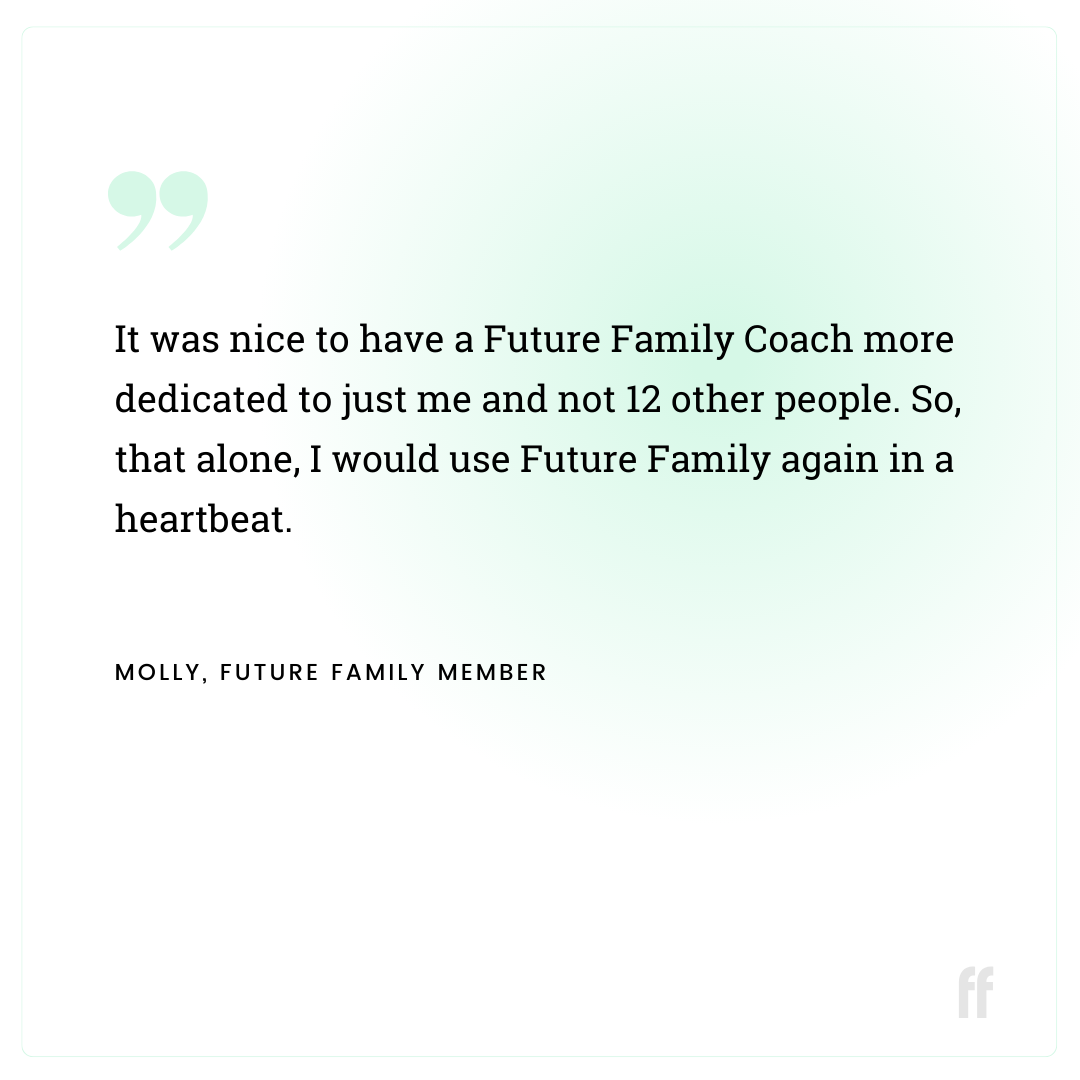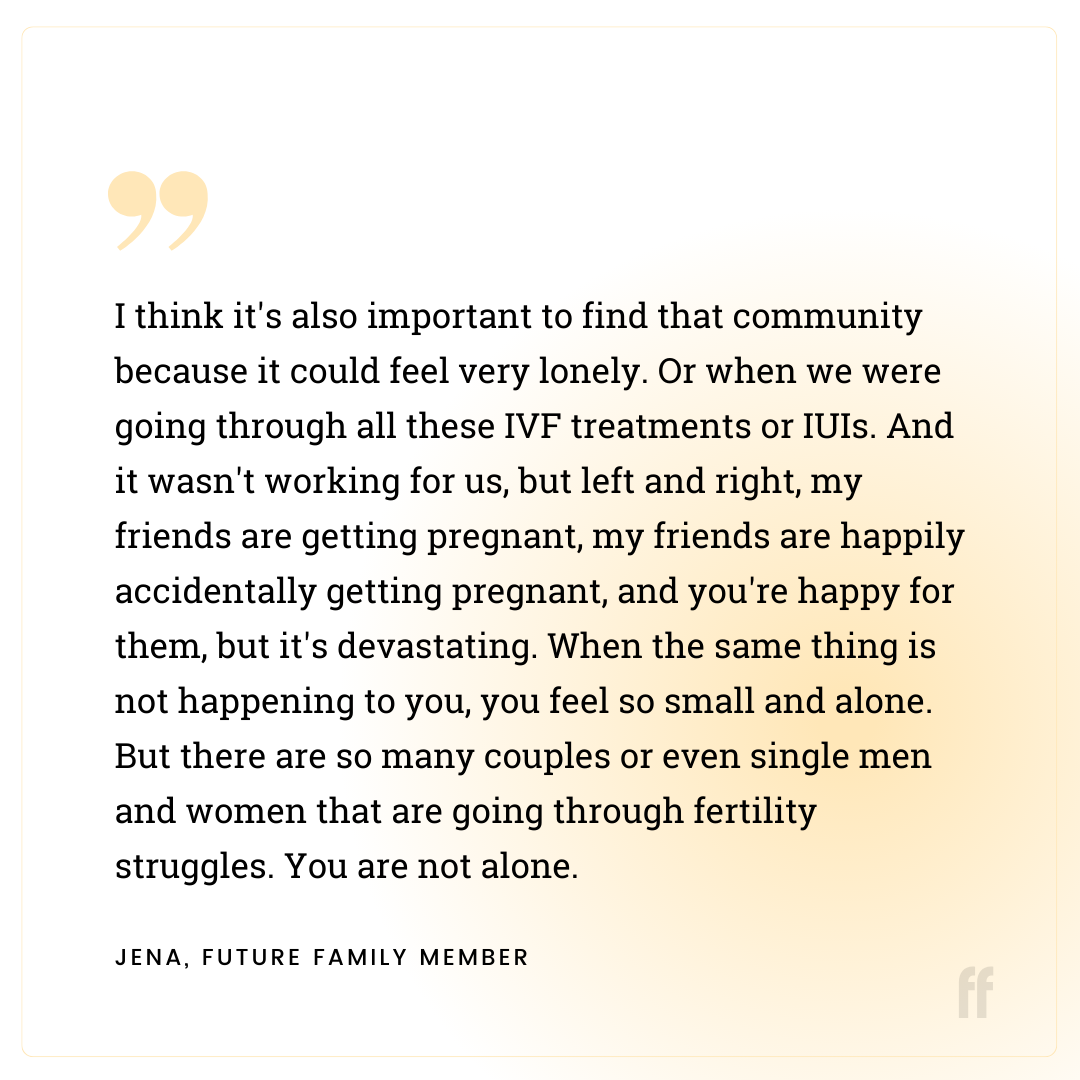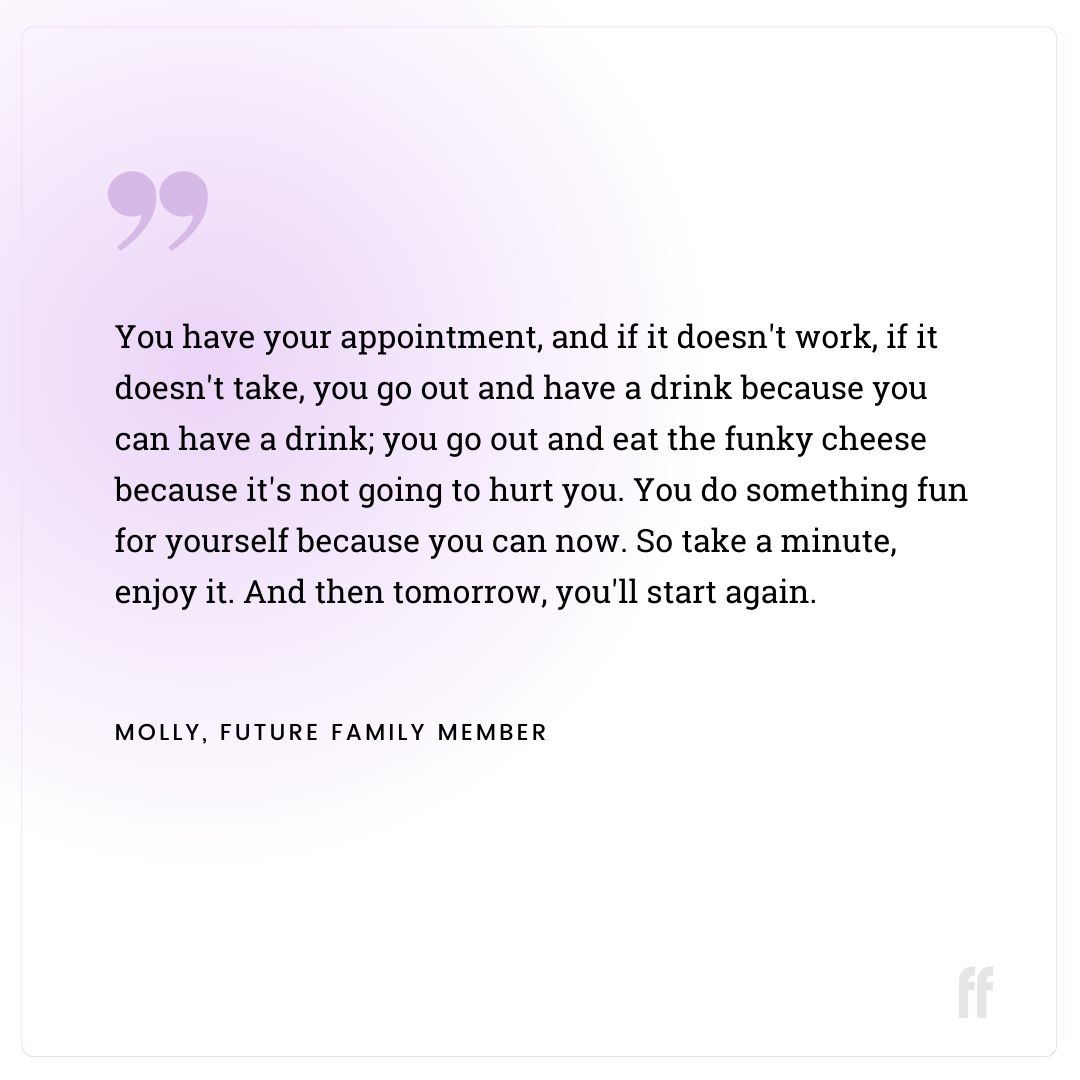Sharing the Future Family Experience with Molly, Jena, and Sawyer
Meet Molly and Jena from Pontiac, Illinois. They always knew they wanted to be parents, and went on a 2 year journey with multiple rounds of IUI and IVF before welcoming their adorable son Sawyer 10 months ago.
How did your fertility journey start?
Molly: We met almost seven years ago, but we both knew that we wanted to be parents. I knew I would be the person to carry, but I wanted to be done with graduate school before starting the fertility process. We tried for almost two years.
Jena: I think we just wanted a child so bad. Molly was done with school; we just felt ready. We tried IUI four times because it was more affordable– still expensive– but more affordable than IVF.
Molly: And for IUI, I mean, I’ve never been pregnant before, but being a queer woman, there is technically nothing wrong with my body and being able to carry a pregnancy. So, in that case, we didn't have to jump right away to IVF, so that's why we started with IUI. But it was still tough. Whenever it doesn't happen, you start to question, what is wrong with my body? What's going on? You start to have those questions.
And that's when you moved on to IVF?
Molly: After the fourth attempt, our doctor said, “This is as many times as I would recommend trying. If it hasn't happened now with IUI, it's probably not going to happen with IUI.” So the next step is IVF. I had to wait 8 months before I could start the IVF procedure. We did two egg retrievals—one with Future Family’s financing and the other with a grant through our clinic. We appreciated doing two because our donor produces a lot of boys. We always dreamed of having a boy and a girl.
So the second egg retrieval, really by chance, we got one girl embryo. So we have that chance for a daughter too.

How was your experience?
Molly: We appreciate our clinic, but the process did have its hardship. The nurse we got with Future Family was so helpful because sometimes the communication with my clinic nurse was lacking. So I would have questions that my nurse through Future Family would answer because she told us, “I've worked with people in fertility for 20 years. I really know what you're going through on the fertility and the medication side.” The clinic staff gives you all these numbers. You're this and that measured X, and it doesn't make any sense to us. We're not doctors. So I could tell my Future Family coach everything, and she'd say “Okay, based on this, you're probably gonna have to go back on this day because you're gonna have to measure again; you can do more blood, and then you're gonna go back on this date.” I really really appreciated that.
Why did you choose Future Family to finance your IVF treatment?
Molly: The big thing for us was that Future Family works specifically with fertility, so it's different from just any kind of loan. The money part is covered, which obviously is important, but it had those extras. No bank is going to email you and tell you what these [clinical] numbers mean. And you’re just an email away. I think I even texted a few times. I was never going to get that kind of help with any bank. Sometimes I didn't even get that help from my fertility clinic. Infertility affects so many people of every kind of background; they have so many patients and just not enough nurses and staff. And I understand that. I can't blame them for that. They're trying to help people. But it was nice to have a Future Family Coach more dedicated to just me and not 12 other people. So, for that alone, I would use Future Family again in a heartbeat.

Jena: I just loved how simple it was because taking out any kind of loan is stressful and nerve-wracking, but this is probably the easiest loan I've ever taken out. It directly comes out of our account every month. I never had any issues with it. I loved the added benefit of having a nurse assigned to us because the ratio of nurses at the clinic to patients is crazy. There were so many times we weren't able to get into contact with our nurse at the clinic, and the nurse that we were provided from Future Family really came in clutch a few times for us.

Can you share an example of when you needed extra support from the Future Family coaches?
Molly: Fertility treatments are extremely time sensitive. And that's something that neither of us knew beforehand. You start your medication at 7pm this exact night, and we don't live near our fertility clinic, so if we didn't have the right medicine, if we didn’t have it ordered, if we didn't have it chilled… And with my job, I work at night driving, so to keep up with the schedule, I would be at a gas station giving myself this IVF shot. It’s so rigorous, and I can’t call my [clinic] nurse at 7 pm and ask a quick question about my shot or something. But I could email or text my Future Family nurse, “Hey, I did my shot at 7:30 is that okay?” Just the little things like that because we didn't have any references or know-how. Even that reassurance about if you're doing things right and is this normal. That alone took a huge weight off our minds because I'm hormonal, I'm crying. It's so, so stressful. Just that extra little bit of someone saying, “It's gonna be okay,” that pays for itself. That is priceless.
Jena: We were terrified that a tiny mistake would ruin the entire course of treatment for that month. Because neither of us have any medical background, and most of the shots weren't just uncap it and stab. It was mixing liquid with powder and all these things we have zero experience with. It was nice to have someone that was so accessible.
What is something that you have learned about yourself or each other?
Jena: Molly's just such an amazing mom, and she had no experience with babies before this. And I know that she was very nervous about it; how would she be as a mother, and would it be natural instinct once he's here. She is just such an amazing mom with zero adjustment period. I'm just so amazed.
Molly: I learned that I could give myself a shot because, at first, Jena had to do all of the shots; I was terrified. I can take a shot, but I can't watch it go into me; it's a weird thing. But then I had to learn because I had to do it on my own.
How did you overcome learning how to do a shot? Any tips?
Molly: I joined some Facebook groups, and I got some tips from others. A lot of times, it’s not the needle going in that hurts. Sometimes it would actually be the medication going in that hurt. So people suggest icing that area a little bit prior to the shot. Another is to give yourself a little treat after you're done because you do a ton of shots. It sucks, and you're doing it every day. So I have a little treat at the end.
Jena also helped. I'd be standing there, terrified and frozen, and she pushed and encouraged me. She never made me feel bad for having that fear. She was always like, “Okay, we'll do it when you're ready; that's fine, we have time.” It validated my feelings, no matter how hormonal or crazy they may have been.
What advice would you give others going through their Fertility Journey?
Molly: The biggest thing is that we had no idea what was happening, and I counted on our clinic to explain everything. So I think education. And that's tough because it's easy to say, educate yourself. We didn't do it, and it's so much you don't even know where to start. But I think the more we had known upfront, the better we could have handled some things. And honestly, I think it would have shortened our timeline. Because you have to be your own advocate, especially in this industry, there are too few nurses to help all the people that need help. You have to stand up for yourself. The more you know as an individual and as a couple, the more you can help yourself.
Jena: My advice is to work together as a team. Molly can't always be the one making the phone calls. She's the one taking the shots, and both partners have to contribute even though she's the one physically going through the treatments. The partner has to step up in other ways. And sometimes that's just asking, “What can I do?” Because there were a lot of times I felt I had no control. I'm going through other things that she's not going through.
Molly: For example, Jena, after working an overnight shift at a prison, would drive with me to my appointments and have to just sit in the parking deck and wait for me. That's all she could do because of Covid restrictions. She couldn’t come inside with me, but she still came with me. So even that little bit was a world of difference because I thought, You're doing everything you can. And I appreciated that. So I agree– teamwork.
Jena: I think it's also important to find that community because it can feel very lonely. When we were going through all these treatments, and it wasn't working for us, but left and right, friends are getting pregnant, and you're happy for them, but it's devastating. When the same thing is not happening for you, you feel so small and alone. But there are so many couples and single men and women that are going through fertility struggles. You are not alone.

These are great. Any last advice?
Molly: You have to give yourself grace, and I think you have to curb your expectations, to be honest. This is not a short process; it took us five years. I had those thoughts, “This is literally what my body was made to do. Why can't I do it?” So you have to give yourself that grace because you won't be able to enjoy any part of it. It's a struggle, but it's to get to something joyful. In the moment, you can get so bogged down by all the craziness, but you have to remember why you’re doing it.
You have your appointment, and if it doesn't work, if it doesn't take, you go out and have a drink because you can have a drink; you go out and eat the funky cheese because it's not going to hurt you. You do something fun for yourself because you can now. So take a minute, enjoy it. And then tomorrow, you start again.

Seek Financing with Future Family
Ready to start your fertility journey? Take 90 seconds to prequalify for a loan today. It's free and does not affect your credit score.